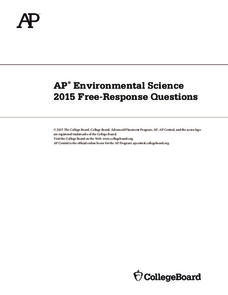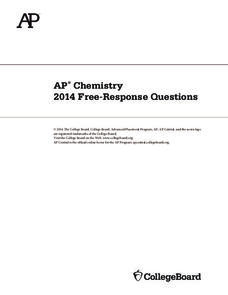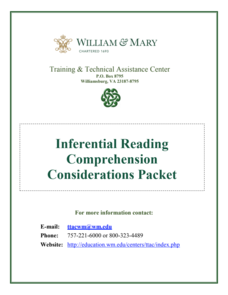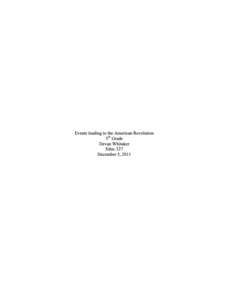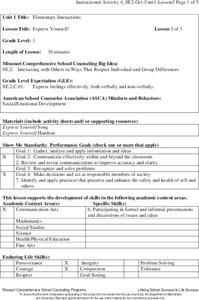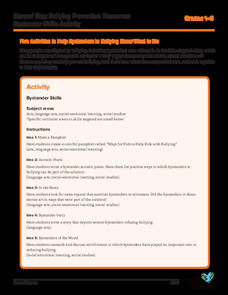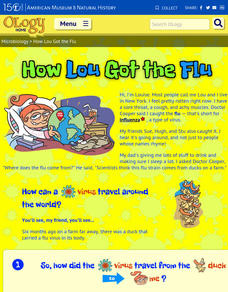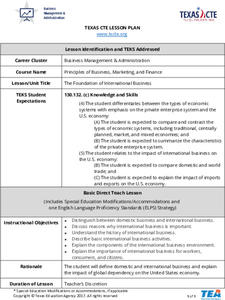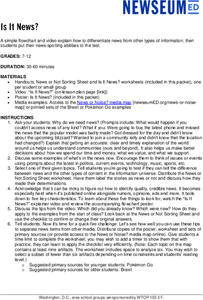College Board
2015 AP® Environmental Science Free-Response Questions
Less than eight percent of AP Environmental Science test takers earn the highest score possible. Help scholars improve their scores by using actual test questions on water quality and urban planning before reading sample responses that...
College Board
2014 AP® Chemistry Free-Response Questions
More than half of AP Chemistry test takers earn a high enough score to get college credit. Improve that statistic by using past test questions including precipitate, molarity, and chemical equations to prepare for a future exam. The...
College Board
2015 AP® Physics 2: Algebra-Based Free-Response Questions
As one of the few AP tests that count for second year college course credit, the AP Physics 2 exam requires a higher level of knowledge than most. Help young scientists study for their upcoming AP Physics 2 exams with previous...
Howard Hughes Medical Institute
Testing a Hypothesis
Are sickle cell disease and malaria related somehow? Scholars learn about both illnesses and the hypotheses that they are related. They discuss, view a video, and answer questions to demonstrate understanding. The resource includes an...
William & Mary
Inferential Reading Comprehension Considerations Packet
Don't forget to read between the lines! Educators learn tips and activities to help scholars learn to infer to increase reading comprehension. Activities suggested include think alouds, backwards words, and who's who. the packet includes...
Poetry4kids
How to Write a Tanka Poem
Take your haikus to the next level with tanka poems, another form of Japanese poetry that regulates the length and rhythm of each line by syllables. Young writers read the explanation, examples, and tips for tanka poems before writing...
Open Oregon Educational Resources
Technical Writing
Hate having to look in multiple sources to find information?Technical Writing contains all information in one book! The book covers everything from defining technical writing, giving examples of technical writing, and tips for creating...
Manchester University
Events leading to the American Revolution
The Stamp Act, Paul Revere's ride, and the Boston Tea Party pushed American colonists to the tipping point that led to the American Revolution. Fifth graders research the key figures of the war, study the Declaration of Independence, and...
University of Waikato
Looking at Water - Solid, Liquid, or Gas
Here's a tip: only one substance is commonly found as a solid, liquid, and gas. Learners use that knowledge as they investigate the properties of water in each state. They interact with water in each of its three phases and record what...
Missouri Department of Elementary
Express Yourself!
Encourage scholars to express themselves with help from an engaging song. Sung to the tune of "London Bridge is Falling Down," participants sing phrases that offer tips for dealing with emotions—sad, happy, worried, proud, mad, and...
Committee for Children
Five Activities to Help Bystanders to Bullying Know What to Do
Five activities covering ELA, social studies, and social and emotional learning offer bystanders tips and the courage to help individuals being bullied. Activities include writing an acrostic poem, creating a pamphlet, reading current...
Western Justice Center
Negotiation
When to negotiate and when not to negotiate, that is the question at the heart of this conflict resolution instructional activity. Class members watch a short video about negotiation tools, read an article about negotiation tips, and...
Royal Shakespeare Company
RSC Activity Toolkit: The Merchant of Venice
Mercy! It's a wise teacher that knows their own students and what they need to appreciate Shakespeare's Merchant of Venice. A 28-page tool kit ensures that every scholar will play a part. The kit is divided into 20 sections, each of...
Story Corps
The Power of Active Listening
Listen up! The game of Telephone launches a study of active listening. Class members watch a short video that demonstrates active listening and tips on practicing active listening. Pairs then interview each other and practice their...
American Museum of Natural History
Finding Fossils
How does one go about finding fossils? Find out with an informative webpage that looks at the digging process, showcases rocks and common fossils, helpful tips, and a list of archeological do's and don'ts.
Nemours KidsHealth
Concussions: Grades 6-8
Teach middle schoolers to learn how to prevent concussions, recognize the symptoms of a concussion, and what they should do in case of a concussion. After reading articles that provide background information, groups create factsheets...
Nemours KidsHealth
Obesity: Grades 6-8
Screen time and fast foods, sugary drinks and greasy fries have lead to one-third of tween and teens being overweight or obese. As part of the Health Problems Series scholars analyze the nutritional value of the school food services menu...
Nemours KidsHealth
Obesity: Grades 9-12
High schoolers take on the role of the nation's first Teen Nutrition and Fitness Czars and create tips that can be texted to other teens to remind them about healthy eating and exercising. Groups read articles to gather background...
American Museum of Natural History
How Lou Got the Flu
Six questions probe participants to discover the possibility of catching a virus from others—even animals. Here, the influenza virus travels from duck to person in a round-about way. The quiz concludes with helpful tips to stay...
Health Smart Virginia
Emotions
Five activity ideas begin a six-part series that looks closely at social-emotional competencies. Activities include ways to incorporate kindness, several lessons from Kids Health, a variety of mindfulness practices, scenario discussions,...
Texas Education Agency (TEA)
Foundation of International Business
Scholars work in teams to research the geography, economic conditions, and cultural factors associated with conducting business in another country. They create a PowerPoint to show what they've learned, and then design a brochure with...
Newseum
Is It News?
Is it news or not? That is the question young journalists must consider in a lesson plan about newsworthiness. Class members watch a short video that details five key characteristics of quality, credible news. Individuals then use these...
Newseum
Search Signals: Understanding Your Top Hits
Class members watch a short video about the criteria used to drive search results to learn about how search engines work. Scholars use a "Search Signals" worksheet and a tip sheet to record information as they conduct a simple search of...
Newseum
Am I Being Fair?
Young journalists use four strategies from an "Am I Being Fair?" tip sheet to check for and counter personal biases about a topic. Scholars apply the strategies to an article about the best pizza as guided practice. Participants then...
Other popular searches
- +Math Tables Tips Tools
- Lesson Planning Tips Esl
- Sales Tax Tips Discounts
- Fire Safety Tips
- Calculating Tips
- Calculating Tax and Tips
- Bicycle Safety Tips
- Math Tables Tips Tools
- Job Hunting Tips
- Sales Tax and Tips
- Spelling Tips
- Study Tips


